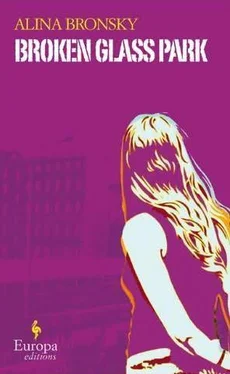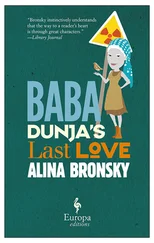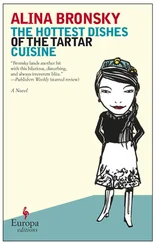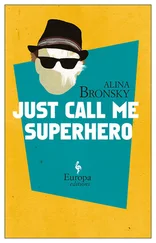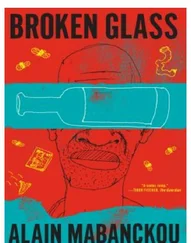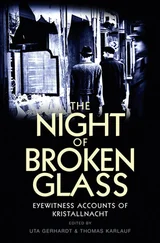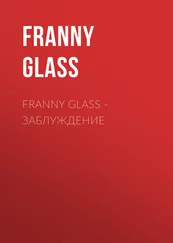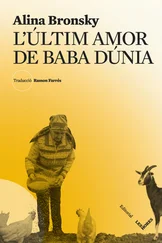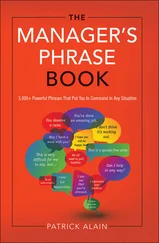“Hi,” I say. He nods and lets me into the apartment.
“Your little sister,” he says instead of a greeting, “is like a siren. My ears are ringing.”
He stretches out his arm, leans against the wall, and looks me up and down. His facial expression is hard to read.
I don’t look away. It doesn’t go unnoticed.
He really is gigantic. Six and a half feet of muscle and acne, adrenalin, and testosterone, and whatever it is you get when you sniff glue, all packed into oddly tight jeans and a white T-shirt. The Marlon Brando of our Russian Ghetto. Long black eyelashes that give his face a feminine note. Which is probably why he lifts weights so obsessively. Light blue eyes, red lips that crinkle easily, a thick gold chain around his neck, and an even thicker one around his wrist. A fat ring on his pinkie and tattoos on his upper arm. There’s the obligatory naked woman — with no head — as well as an eagle and some symbol I don’t recognize.
No, he doesn’t sniff glue, I think. His eyes are too clear and observant. Maybe a couple of beers and a joint, but only on weekends. He can restrain himself. Probably drinks protein shakes and pops vitamins.
I think he’s younger than me. I’m pretty sure he’s only sixteen.
There sure are a lot of sixteen-year-old boys in this world.
“How’s it going?” he says.
“Fine,” I say. “You?”
A door flies open and Alissa comes stumbling out. She’s pulling a toy wagon with three Barbies lying in it. She sees me, shouts a greeting, and pulls the wagon past me and Peter and on into another room.
“Come on, Katja,” she screams. “Where are you?”
Katja comes out of the doorway. She’s a year older than Alissa, already five. Her face is round. Her pink tights are twisted around. And too small. Katja’s one of those chubby kids who can’t help bringing attention on herself — the wrong kind. For instance, I have rarely seen her without a chocolate bar in her mouth. Even now her mouth is smeared brown. So is Alissa’s.
“Hi, Katja,” I say. She jumps, startled, and stares at me. “What are you playing?”
“I don’t know,” she mumbles.
“What do you mean you don’t know? You’re one of the ones playing it.”
“Formula One,” shrieks Alissa from the next room. “We’re playing Formula One racing. Come on, Katja.”
Katja sticks her thumb in her mouth. Her eyes are the color of water, like Peter’s. There must be twenty-six barrettes in her hair.
I wink at her. She takes her thumb out of her mouth and hides her hand behind her back.
“How come you never come up to our place?” I ask. “I think Alissa would like it.”
Katja says nothing and looks over at Peter. Peter looks at me from above and likewise says nothing.
“I’m not allowed,” mumbles Katja.
“Why aren’t you allowed?” I ask. “Who said you weren’t allowed?”
“Mommy,” she says.
I raise my face to look directly at Peter.
“Why isn’t she allowed?” I ask. “Does your mother think we eat children?”
The corners of Peter’s mouth turn up. “How should I know,” he says. “As far as I’m concerned she can visit you anytime she wants. I’d enjoy the peace and quiet.”
“I’m not allowed,” Katja says more stridently.
I kneel down in front of her. “I’ll ask your mother if you can, okay?”
She nods. Then she nods again, more vigorously. “I want to see Alissa’s robots,” she says.
“I’ll ask your mother,” I repeat. “When will she be home?” I ask, this time directing the question to Peter.
“Forget it,” Peter says, stretching and touching the ceiling as he does. “She comes home at seven, but you can save yourself the trouble.”
I stand up. I stretch, too, but I only reach the level of his shoulders. “What do you mean?” I ask angrily. “What did we ever do to your mother?”
“You know how they are around here,” says Peter. “She’s afraid. She was home the night it all went down at your place. I can hardly believe she lets the little runt come over here even. The adults are all so spineless and stupid.”
“It was Vadim,” I say. “Vadim did the shooting. Not me. Not Maria. Why shouldn’t Katja be allowed to come over?”
Peter shrugs his massive shoulders.
“Look, personally I don’t give a shit,” he says. “But my mother says you can still smell tragedy up on the eleventh floor. She’s a bit out there. When she sees a black cat she spits three times over her left shoulder so nothing bad happens to her.”
“Is that it?” I ask. “She’s just superstitious?”
“I’ve never asked her,” he says, “but if I were in your position, I’d want to move out of that apartment.”
“Why?”
“It’s poisoned. Somebody was stabbed nine years ago on the eighth floor — you weren’t here yet — and to this day there’s only one apartment rented out on the entire floor.”
“You can’t be serious.”
“You can still see the blood stains on the floor in front of your apartment.”
“That’s just dirt.”
“Right.”
“If your father killed your mother,” I say, “would you want to move out of here? The apartment where you lived together with her? The place you call home? And her last home? Would you really split?”
“That would never happen to my mother,” Peter says.
That hurts. I only realize after a few seconds that I’ve clenched my fists so tightly that my fingernails have pierced the skin on my hands. There are several red, crescent-shaped cuts.
“Your mother?” I say. “No, you’re right, it would never happen to her.”
“What?” says Peter. “What do you mean by that?”
“What did you mean?”
And then I realize Peter is smarter than I thought — he doesn’t answer.
The children’s voices have gone quiet. And I can now hear the music coming out of the open door to Peter’s room. I know the song.
The drunken doctor
Told you
That you
No longer exist.
The fire department says
Your house
Has burned down.
“No way,” I say. “You listen to Nautilus Pompilius?”
“What else am I supposed to listen to?” says Peter, annoyed. “The Lollipops? What’s your problem?”
I have no problem. I stand there, try to breathe. Everything swims in front of my eyes.
“You listen to that?” I say pointlessly.
“For god’s sake,” Peter says, pissed off. “No, I don’t listen to it. I eat it.”
The song hits me like a punch in the gut.
There’s no way Peter really listens to the music of this long-forgotten Russian goth band. My mother liked them. She listened to a lot of rock and pop, as well as chansons and musicals and opera. She never got stuck in any one genre.
How is it possible, I wonder, that here — in an apartment that reeks of coal, that’s scrubbed spic and span, a place where every piece of furniture is draped with a doily, where there are plastic flowers in vases on the windowsills, where the walls are covered with the type of horrible pictures of pink children that you can get three-for-ten-bucks at the supermarket, where red-checkered curtains flutter in the wind — that here of all places, this music is played?
In a strange room
With a white ceiling
A right to hope
And a belief
In love.
I stare at the checkered curtains.
We never had curtains. My mother hated them. It might be the one thing she categorically ruled out. She always wanted to have the windows open. The sun should come in. “Let the sun in and the rain will follow.” That’s a line from Die Fantischen Vier my mother liked. Yep, she even liked German hip-hop. The first thing Maria did when she arrived was to sew curtains — loudly colored, with giant flowers all over them. She put them up and pulled them closed.
Читать дальше
